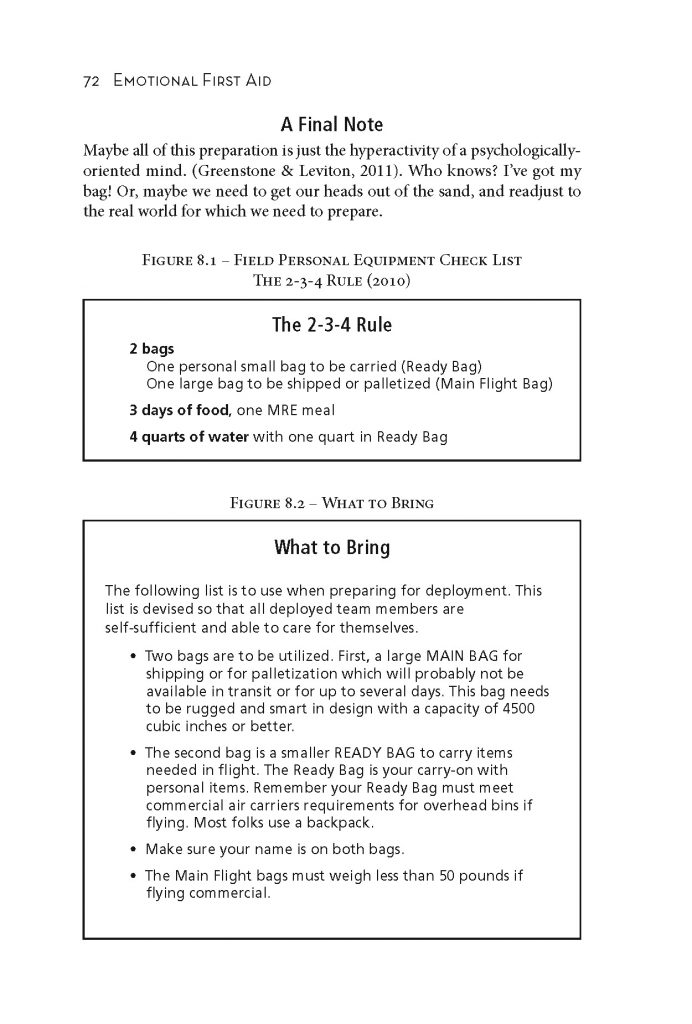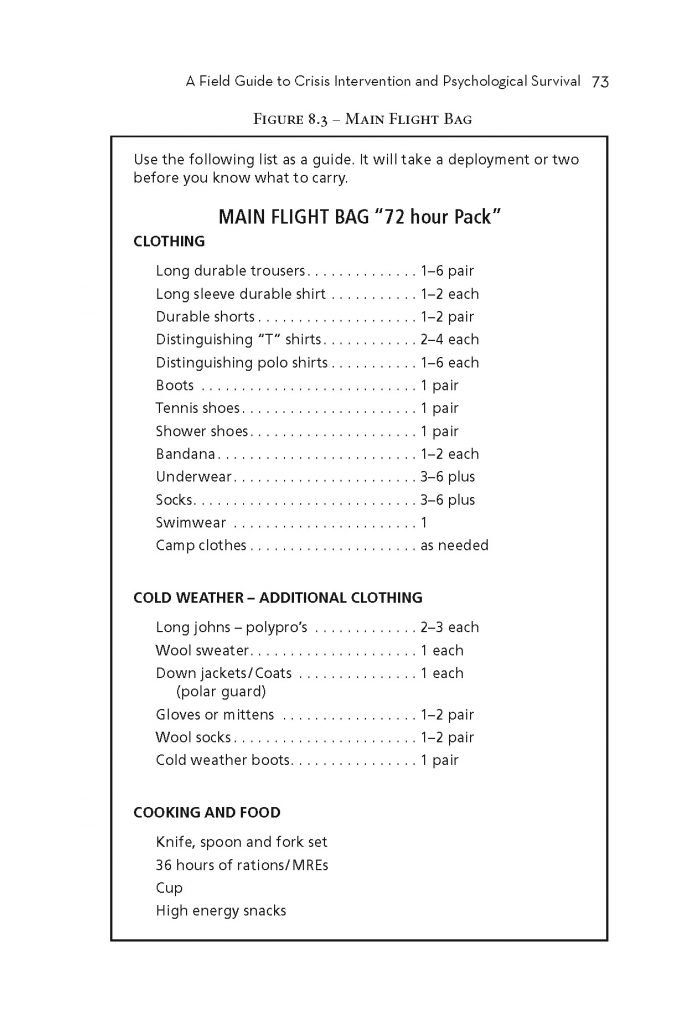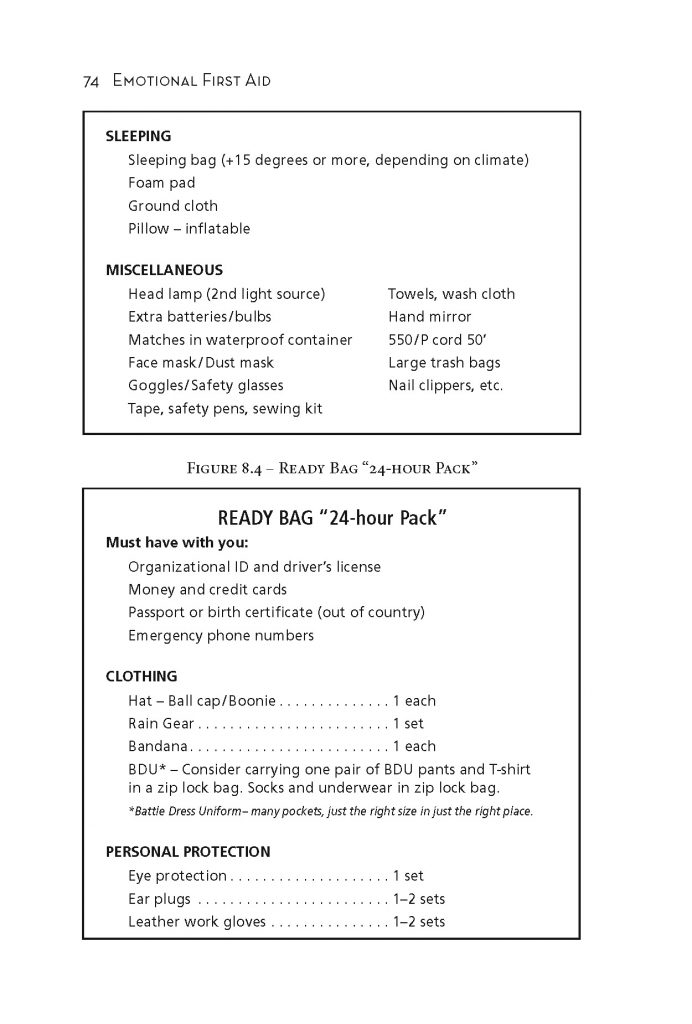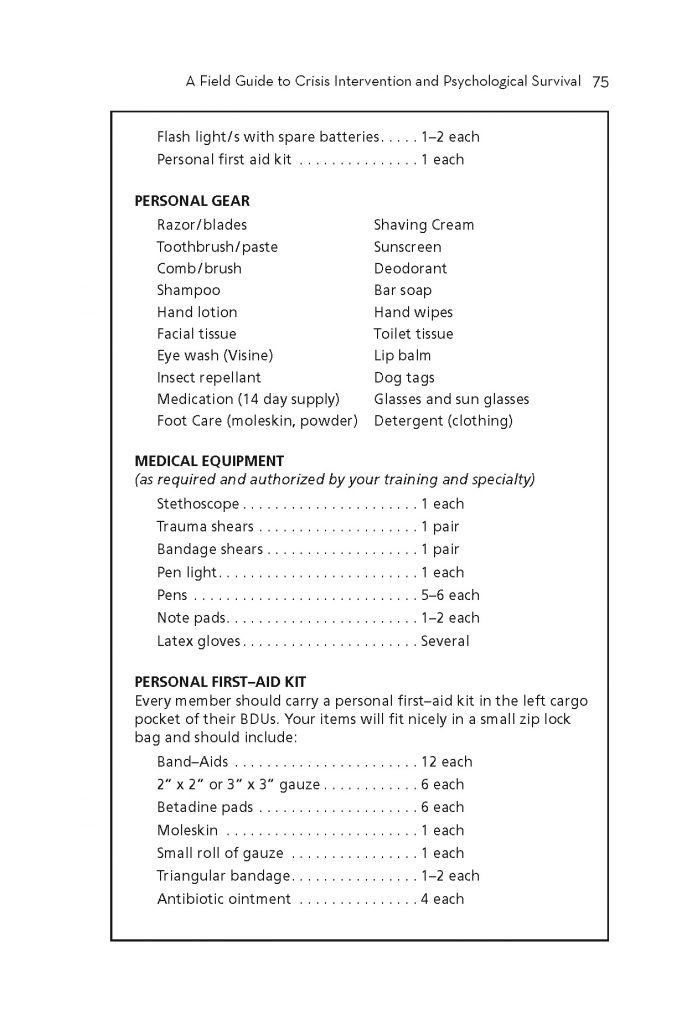Am I packed and ready to go? Why on Earth Not?
By COL James L. Greenstone, EdD, JD, DABECI.
Excerpted from Emotional First Aid.
If denial exists anywhere, it exists here. The seemingly unconscious process of refusing those implements of survival that might be needed during a disaster scenario because acceptance of that need also means acceptance of the likelihood of a disaster occurring, is the focus here. Disasters do and will occur and you need to be ready. As Sherif and Sherif stated in their seminal work, An Outline of Social Psychology, 1956, refusal of the implements of survival denies that reality. Acceptance confirms it. Perhaps acknowledgement of this process will impact the individual’s frame of reference or psychological structuring, and thereby affect observed behavior.
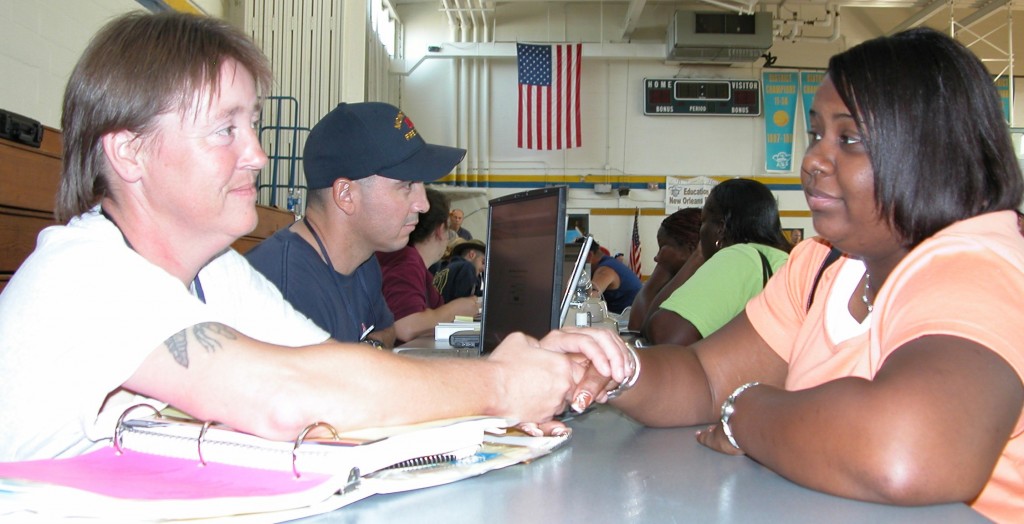
Working in an organized disaster recovery area
The Issue
Perhaps the reason that people refuse to prepare for the onset of a disaster relates to the psychological term: “Orange Bag Denial.” (Greenstone, 2009). Manmade and natural disasters will occur. One has only to look around themselves to confirm this reality.
Many will remember a few years ago when, in a prominent way, a product came on the market that promised to provide sufficient supplies to help an individual to survive the first 72 hours of a disaster, man-made or natural. These provisions were carefully provided in an orange canvas backpack that sold for about $30 – $35. The supplies provided would have probably cost more than the $35 price tag if one were to purchase them separately. In addition to the flashlight, batteries, water, food, tools, and the like, the size of the backpack allowed for personal gear such as extra clothing and other supplies. Altogether the pack was still light enough for even the slightest individual to carry the bag and to move around with ease.
The Search
Being a preparer, my personal “go bag” has been ready for the various circumstances in which one might find himself. Even so, this new orange bag was of some interest. As one might expect, it was quickly determined that they were readily available at most super stores in the area. What was found there was surprising and yet not completely unexpected.
An individual search of the store began. (This was probably because of an aversion to asking for directions.) Anyway, the bags were nowhere to be found even though advertised. Finally, several employees were approached for directions to the bags. They were found standing together obviously discussing profit and loss statements. They were not knowledgeable about the bags and could not recall seeing them on the store shelves. The manager was summoned. He knew about the bags. He explained that they had been removed from the shelves because they were not selling: an inkling that something was afoot. The manager explained that he was about to return the bags to the supplier but that they were still in the store stock room.
In the stock room, a bin was full of the orange emergency bags. The manager was asked if the bags were still available for sale. He said that they were and that he would sell them at an incredibly good price for as many of them as were desired. The price was so good, all were purchased. An immediate thought was that they could be given as Christmas or Chanukah gifts.
Who knew?
After the bags were purchased and loaded into the car, they were transported to be used as presents.
The Results
When it was mentioned to a very smart wife that the bags would be given as gifts, she warned against such action. Not fully understanding the issues, this author argued, disagreed and finally acquiesced. This proved to be the correct choice. The rest was amazing.
There were several family members and fellow preparers, to whom this writer was close personally, and to whom the bags might be given. Not so such as a holiday gift, but later because of concern about their readiness if something bad happened.
Most of the few close friends to whom the orange gifts were given were visibly and verbally shocked by this expression of kindness. To a person, their eyes bugged, they appeared stunned. They asked why such a gift would be given to them. Several were shocked and asked, “Do you know something that I don’t?”
Therein was born the concept of the Orange Bag Denial. Acceptance of the gift would also mean an acceptance of the possibility that a disaster might occur and that the contents of the orange bag might have to be utilized. The alternative, not to accept the bag, as a few did, in essence was avoidance and a denial of such a possibility. In other words, “If I do not take the bag designed for a disaster, maybe I will be spared the disaster. On the other hand, if I accept the bag, then also I have to accept the fact that a disaster may occur for which I may need these supplies.”
Some of the Related Numbers and Findings
There are at least four stages of preparedness denial. According to Eric Holdeman (2008), Director of Emergency Management for King County, Texas, the four stages are:
1. It won’t happen,
2. If it does happen, it won’t happen to me,
3. If it does happen to me, it won’t be that bad; and
4. If it happens and it is bad, there is nothing that I can do to stop it anyway.
In an August 2006 poll conducted by Time Magazine, it was reported that most American citizens were not prepared for a disaster and had their heads in the sand. Half surveyed said they had experienced a disaster. Only 16% of those said that they were adequately prepared for another disaster. Many justified their poor preparation by indicating that they did not need to prepare because that they did not live in areas of high risk for any kind of disaster (Ripley, 2006).
Facts seem to support the assertion that 91% of Americans live in places of significant risk to some type of disaster situation that could dramatically affect their life. This study was conducted by the Hazards and Vulnerability Research Institute at the University of South Carolina (Ripley, 2006). There seems to be a fine line, according to this quoted article, between optimism and foolishness. In a country whose citizens, many times, distrust its leaders, the vast majority continue to think that in a disaster our government, local, state, and national, will quickly come to our aid as in non-disaster times. The response to Hurricane Katrina is the strongest current counter-testimony to this ill-conceived belief.
Read through the following pages from Emotional First Aid. Dr. Greenstone has compliled a comprehensive list of what you need when you are called. Click the page for printable versions.

